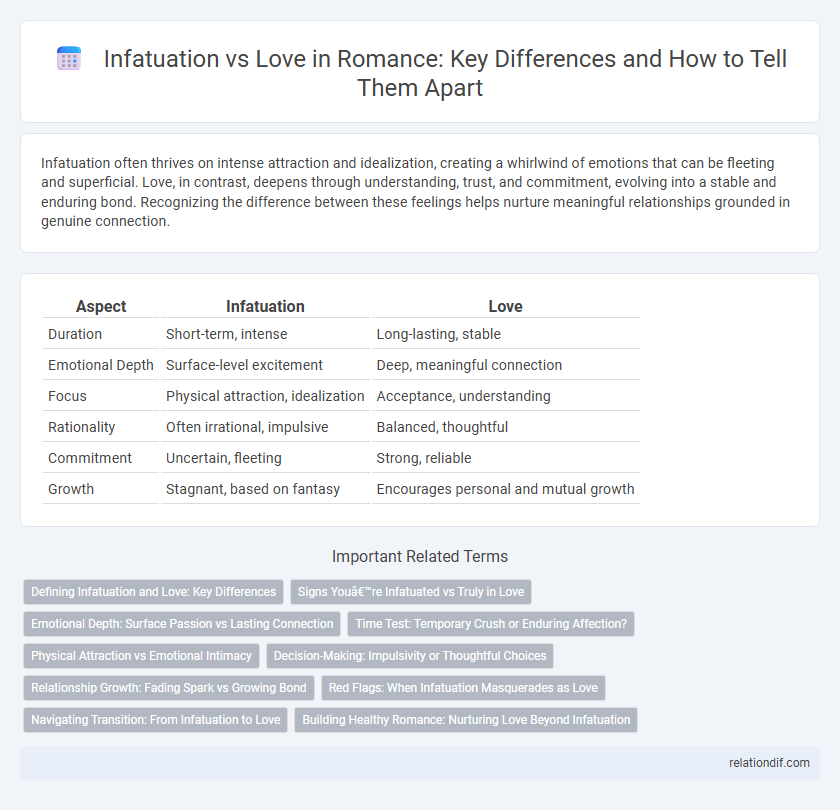Infatuation often thrives on intense attraction and idealization, creating a whirlwind of emotions that can be fleeting and superficial. Love, in contrast, deepens through understanding, trust, and commitment, evolving into a stable and enduring bond. Recognizing the difference between these feelings helps nurture meaningful relationships grounded in genuine connection.
Table of Comparison
| Aspect | Infatuation | Love |
|---|---|---|
| Duration | Short-term, intense | Long-lasting, stable |
| Emotional Depth | Surface-level excitement | Deep, meaningful connection |
| Focus | Physical attraction, idealization | Acceptance, understanding |
| Rationality | Often irrational, impulsive | Balanced, thoughtful |
| Commitment | Uncertain, fleeting | Strong, reliable |
| Growth | Stagnant, based on fantasy | Encourages personal and mutual growth |
Defining Infatuation and Love: Key Differences
Infatuation is an intense but short-lived passion characterized by idealized attraction and obsessive thoughts, often driven by physical appearance and immediate gratification. Love develops gradually, rooted in deep emotional connection, trust, and long-term commitment that withstands challenges. Unlike infatuation's fleeting nature, love embodies enduring affection and genuine understanding between partners.
Signs You’re Infatuated vs Truly in Love
Rapid heartbeats and obsessive thoughts often signal infatuation, marked by intense but fleeting emotions focused mainly on physical attraction. True love develops gradually, characterized by deep emotional connection, mutual respect, and a desire to support each other through challenges. Recognizing patience, empathy, and long-term commitment as signs of genuine love helps differentiate it from the temporary excitement of infatuation.
Emotional Depth: Surface Passion vs Lasting Connection
Infatuation often ignites with intense but fleeting emotions, characterized by surface passion and idealized perceptions. Love, by contrast, involves deeper emotional depth, fostering lasting connections built on trust, empathy, and mutual understanding. This profound bond enables couples to navigate challenges and grow together beyond initial excitement.
Time Test: Temporary Crush or Enduring Affection?
Infatuation often ignites quickly, fueled by intense emotions and idealized perceptions, but it tends to fade when confronted with time and reality. Love develops gradually, deepening through shared experiences, trust, and emotional resilience, proving its strength over months or years. The true test of affection lies in its ability to withstand daily challenges, evolving beyond initial attraction into lasting commitment.
Physical Attraction vs Emotional Intimacy
Infatuation often centers on intense physical attraction that triggers a rush of dopamine and adrenaline, creating a temporary, surface-level connection. Emotional intimacy in love develops gradually, involving trust, vulnerability, and deep understanding that fosters lasting bonds beyond mere appearance. Distinguishing between these phases helps individuals build meaningful relationships rooted in genuine emotional connection rather than fleeting desire.
Decision-Making: Impulsivity or Thoughtful Choices
Infatuation often triggers impulsive decision-making driven by intense emotions and immediate gratification, causing individuals to overlook potential red flags or long-term compatibility. In contrast, love encourages thoughtful choices based on mutual respect, deep understanding, and a commitment to growth, fostering more stable and enduring relationships. Recognizing the difference between impulsivity and deliberate evaluation is crucial for cultivating genuine romantic connections.
Relationship Growth: Fading Spark vs Growing Bond
Infatuation often ignites with intense emotion but tends to fade quickly as novelty wears off, leaving only fleeting excitement. In contrast, love fosters a deepening bond through mutual understanding, trust, and shared experiences that nurture long-term relationship growth. Recognizing the difference between a fading spark and a growing bond is essential for building lasting romantic connections.
Red Flags: When Infatuation Masquerades as Love
Infatuation often disguises itself as love through intense obsession and idealization, masking potential red flags like possessiveness and unrealistic expectations. Unlike genuine love, infatuation lacks depth and fails to withstand challenges, leading to emotional volatility and disappointment. Recognizing these signs early helps differentiate fleeting passion from sustainable emotional connection.
Navigating Transition: From Infatuation to Love
Infatuation often ignites with intense emotion and idealization, driven by physical attraction and fantasy, whereas love deepens through genuine understanding, trust, and emotional intimacy. Transitioning from infatuation to love requires consistent communication, shared experiences, and mutual respect to build a foundation beyond initial passion. Recognizing this evolution helps partners navigate challenges and foster a lasting, meaningful connection grounded in authenticity.
Building Healthy Romance: Nurturing Love Beyond Infatuation
Building healthy romance requires nurturing love beyond the fleeting emotions of infatuation by fostering deep emotional connection and mutual respect. Trust, effective communication, and shared values form the foundation for a lasting relationship that grows stronger over time. Prioritizing empathy and understanding allows partners to navigate challenges together, transforming initial attraction into enduring love.
infatuation vs love Infographic

 relationdif.com
relationdif.com